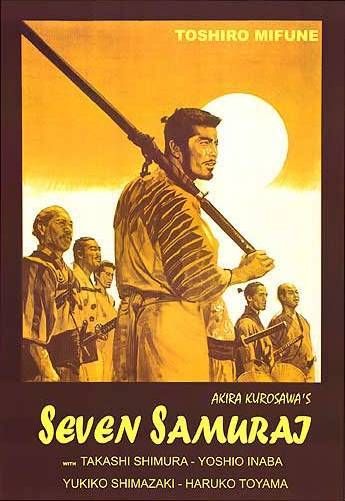no,7 on my top 10: "The Seven Samurai" by Aikira Kurasawa

Oddly the movie poster doesn't list Toshirô Mifune but he plays the important part of the guy who brings the seven together. We saw him as the Samurai in Roshimon. The other actors portraying the seven were older and more established. This film was released in 1954,Mifune went on to become the Japanese Samurai what John Wyane is to the American cowboy. Indeed the Samurai film is the Japanese western. It's an "eastern western." The Seven Samrai is clearly an action film and ranks among one of the greatest action films ever made. Samurai films are an acquired taste. I know film buffs who love Kurasawa but can't stand Samurai films. The can be bloody and full of gore. As that goes this one is not so bad on that score. It's clearly a genre and as such there's a spectrum from inane to great.
Seven Samurai clearly comes down in the category of great. The film exhibits themes of self respect, impendence and freedom over tyranny, the weak defending themselves against the strong, the nobility of a futile struggle for right, self sacrifice, class struggle, team work. The use of suspense is superb. It's an action film, it will keep on the edge but not by use of explosions, or amazing special effects. It's done the old fashioned way, with plot and acting. Mifune is running around trying to find Samurai to help him defend a village of rice farmers from marauding bandits. He finds out of work men who are Samurai but they are either old and past their prime. This film is directly responsible for the Magnificent Seven (American Western). But in that film they were mostly well known or obviously skilled. The Samurai or more of an unknown quality and he has to take who he can get. The people of the village want to dicker over defense, the Mifune character ia hard on the villagers. As it turns out over time he's not a real samurai but the son of a rice farmer. He grew up in a village just like the one they are defending. He wants the villagers to be independent. He wants them to learn to fight for themselves. He left home because wanted to be something. He found a dead samurai and took his weapons and taught himself to use them. The villagers do learn and they do fight. Many of them die. The film depicts an Alamo like struggle. Maybe that's why is resonates so with me, I'm from Texas.
Comments
Post a Comment